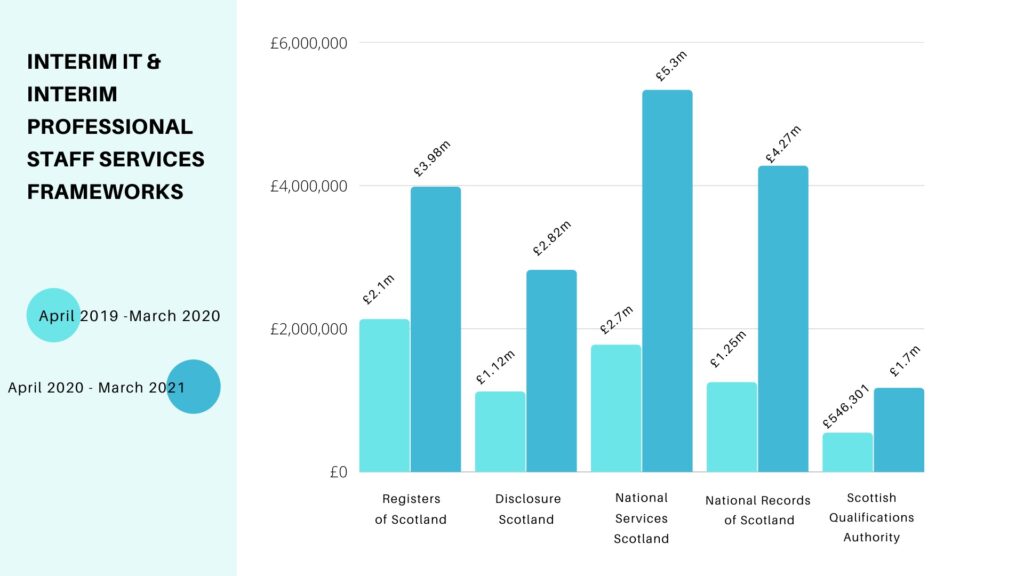Public sector spend on interim IT and professional staff services more than doubled in the year of the pandemic, according to new figures.
Some 70 organisations including the NHS and the agency responsible for student exams shelled out a total sum of £69.4 million between April 2020 and March 2021.
Data released under freedom of information (FOI) laws reveals that spending in the previous year was £28.4m, underlining how the public health crisis has forced services to switch to online.
The Scottish Government’s budget for its own framework agreements expanded almost three-fold, rising from £11.6m in 2019-20 to £30.9m in 2020-21.
After the government, those with the highest spending figures included NHS National Services Scotland (NSS) and National Records of Scotland (NRS). In 2019-20 NSS invested £2.7m into interim staff services and in 2020-21 this figure rose to £5.3m. Likewise, NRS pumped £1.25m into the framework agreements in 2019-20 and £4.27m the following year.


The Scottish Government’s framework agreements are open for use to the whole of the Scottish public sector.
Its framework for interim IT staff helps oranisations fill roles such as IT field engineer and database developer, while its framework for interim professional staff services helps bodies fill roles such as business analyst, finance specialist and programme manager.
Deryck Mitchelson, director of digital and security at NSS said: “Throughout 2020 NSS Digital and Security services were directly involved in enabling the digital response to Covid-19. The support and delivery of the digital infrastructure underpinning Test and Protect and Covid-19 vaccinations accounts for the significant additional costs. Given the unprecedented circumstances and pace of implementation required we needed to rapidly supplement our workforce with additional capacity.”
A spokesperson for NRS said: “National Records of Scotland (NRS) is preparing to deliver Scotland’s Census 2022, which is the official count of every person and household in the country. This is a national programme that requires NRS to grow considerably in size to deliver, the result of this is an increase in our yearly budget to allow us to recruit additional people, bringing in specialised skillsets including IT expertise.”
In response to the FOI request seeking to know the “total spend for each public body” in relation to the framework agreements in the last two years, the Scottish Government published a list of all the organisations that used them.
In 2019-20 this was 76 and in 2020-21 it was 77. One organisation which made use of the framework agreements both years is Disclosure Scotland – an executive agency of the government providing criminal records disclosure services – which spent £1.12m in 2019-20 and £2.82m in 2020-21.
A spokesperson for Disclosure Scotland said: “The staff profile at April 2019 reflected the position of our transformation programme at that time. During this period, Disclosure Scotland was operating with a major delivery partner providing our technical resource. The increase in costs during 2020/21 saw us move from this model to an in-house managed team, consisting of a blended team of contractors and civil servants.
“We no longer need to pay the external IT supplier. This has been very successful as we have in the last 15 months developed and delivered a new online portal for our flagship PVG Scheme, which has been lauded by customers and which is used by 90 per cent of PVG customers. This has resulted in savings to the public purse as we no longer require as many temporary staff to make manual data entry into our systems.”
They added: “We operate in a competitive technology market and require a diverse set of skills to support our estate and build for the future. For the short to medium term, our needs are best served by seeking the specific skill sets we required from the contractor market, recognising that wherever possible we seek to expand our permanent staff presence by recruiting and training civil servants in-house, which will reduce the extent that we need to retain IT contractors.”
The organisation provided a breakdown of their spending. In 2019-20, it spent £1m on IT contractors and £117,742 on other professional services. The following year followed a similar pattern, with £2.6m spent on IT contractors and £172,984 on professional services.
The Scottish Qualifications Authority (SQA) has also relied on the government frameworks to counteract staff shortages in IT over the past two years. In 2019-20 it spent £546,301, and in the following year spent £1.7m.
An SQA spokesperson said: “We had to invest significantly in our IT capabilities at short notice so we could operate remotely during the most important time of year for the qualifications system. Many other public and private organisations found themselves in a very similar position. Using the pre-approved suppliers on the Scottish Government’s frameworks was the most appropriate approach and in some cases the only realistic way of meeting this exceptional challenge.”
The assessment body also included a breakdown of its spending, sharing that the investment in 2019-20 relates entirely to IT staff, while in 2020-21, 79 per cent related to IT staff and 21 per cent to professional staff services.
It is important to note, the SQA said, that public organisations may use many other ways of securing the services they need, such as direct recruitment, other external frameworks, their own frameworks, and single-supplier contracts.
As such, Scottish Government frameworks can not accurately represent what a service spends on suppliers or likewise represent changes in their spending.


A Scottish Government spokesperson said: “Collaboration across the public sector is an efficient way to ensure sustainable procurement in line with best practice. This ensures public sector organisations can recruit temporary and interim staff to address immediate resource needs, while supporting a range of Scottish businesses including small and medium enterprises.
“The Scottish Government is an accredited real living wage employer. We offer pay parity for all agency workers from day one, and strongly encourage all public sector employers in Scotland to do the same. We expect those who deliver public contracts to adopt ethical business practices and have issued statutory guidance to ensure fair work practices are considered in procurement processes.”
The interim staff services framework agreements spend fluctuates year on year, depending on the number of organisations utilising them and their individual requirements.
According to a government official, there is no evidence to suggest the pandemic has played a part in the notable rise in 2020-21 spending figures.
The current temporary and interim staff services framework agreements were awarded in April 2019 and will remain in place until March 2023.
It seems that any individual contracts from the previous framework agreements that were still in place in 2019-20 would have recorded spend against the previous framework agreements.
The framework agreements from pre-April 2019 are not published, but total spend from April 2018 to March 2019 was reportedly £65.7m.
This may also explain why spend is substantially lower in 2019-20 in comparison to 2020-21.
Other organisations who used the Scottish Government framework agreements include Transport Scotland, which spent £589,508 in 2019-20 and £1m the following year, and NHS Education for Scotland, which spent £485,256 and £1.5m respectively.
To view the full list visit the Scottish Government website.




